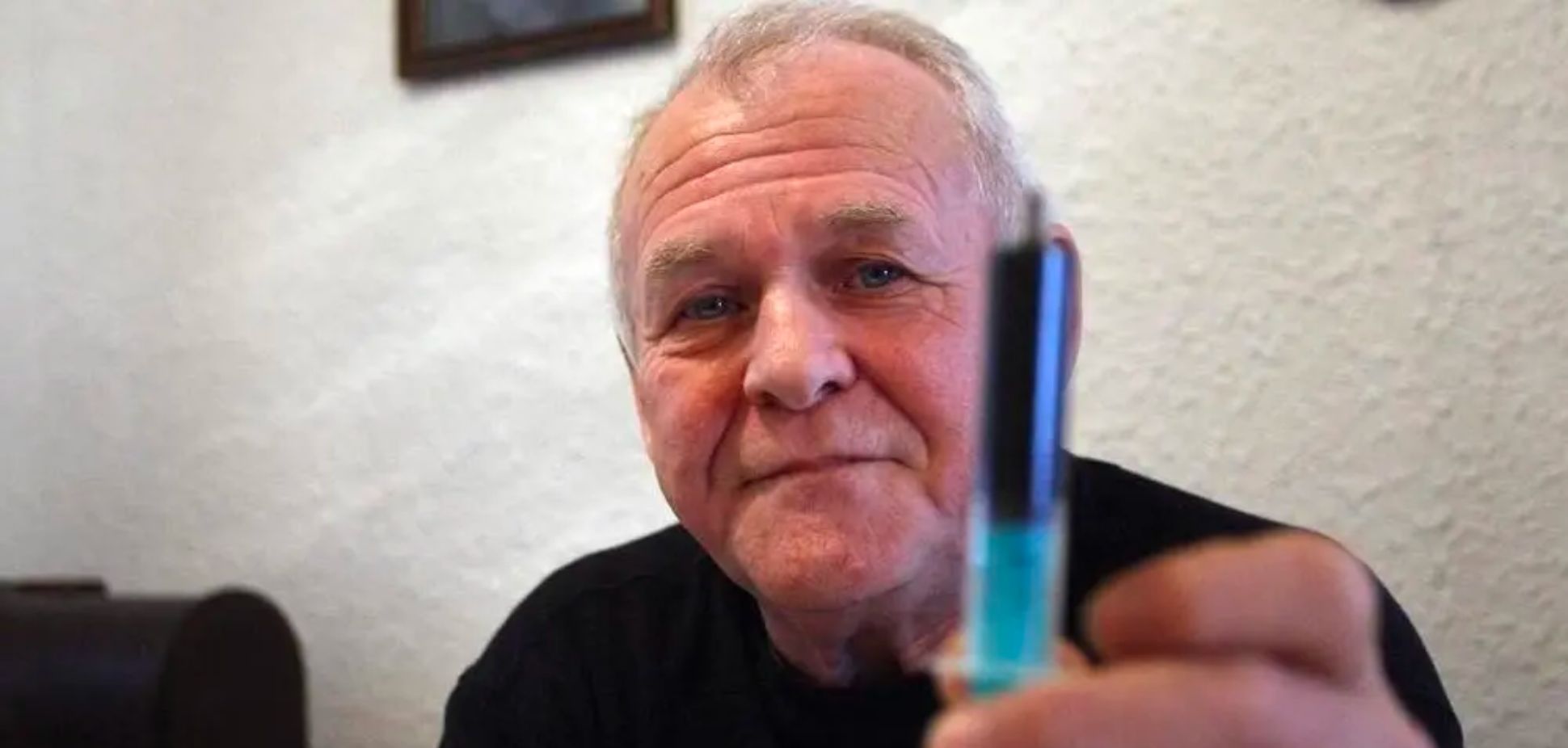#46: Rick Simpson's Quest for Healing: The Story of Phoenix Tears
#46: Rick Simpson's Quest for Healing: The Story of Phoenix Tears
The world of medical cannabis has been shaped by the relentless efforts and unwavering advocacy of numerous pioneers. Among these trailblazers, one name stands out for his significant contribution and immense influence - Rick Simpson.
Rick Simpson is a retired power engineer from Nova Scotia, who developed a revolutionary extract from cannabis known as Phoenix Tears or Rick Simpson Oil (RSO). This potent extract is renowned for its vast array of medicinal uses and has been credited with countless testimonies from healing journeys involving cancer, epilepsy, chronic pain, PTSD, anxiety and much more.
Simpson's contribution to the world of medical cannabis is monumental. Through the development of Phoenix Tears, he has helped thousands of people discover alternative methods of healing and gain access to a powerful natural medicine. His tireless advocacy has also raised awareness around the potential benefits of medical cannabis, from treating physical ailments to mental health conditions.
In this article, we explore Rick Simpson's journey and the history of RSO, from its origins to its current place in the medical cannabis industry. We'll also take a look at the ways in which Rick Simpson has impacted the industry, and how his mission of natural healing continues to make waves today.
The cannabis crusader: Rick Simpson and the birth of RSO
Growing up in Nova Scotia, Rick Simpson had a passionate interest in alternative medicine. He believed that the key to healing and well-being could be found through natural remedies. Little did he know at the time, that this would lead him on an unexpected journey that would eventually become synonymous with medical cannabis.

In the late 1990's, Rick was removing asbestos from a poorly ventilated hospital when he was knocked out by the fumes. Afterward, he began to experience a range of medical issues that included tinnitus and chronic vertigo. When traditional medicine failed to provide any relief, cannabis became an essential part of his treatment plan, and he began to grow his own plants and make homemade extracts.
Sadly, in 2002, Rick's life took an unexpected turn when he was diagnosed with basal cell carcinoma, a skin cancer that can be fatal if left untreated. This prompted him to look into alternative treatments when he recalled reading a study in the 1970s from The Journal of the National Cancer Institute which found that THC killed cancer cells in mice.
With this newfound knowledge, Rick began applying his extracts to the affected area on his skin, and remarkably after four days of topical application, his skin cancer had disappeared entirely.
Word spread quickly of Rick's cannabis extract and the healing effects it had on him, inspiring others to try it for themselves. He began providing his extract and the recipe for others to make their own, and soon people from around the globe were using the oil to treat their own ailments.
With this newfound knowledge, Rick began experimenting with extracting THC from the cannabis plant. He created a potent, highly concentrated form of cannabis extract, nicknamed Phoenix Tears, that he began applying directly to his skin cancer. Remarkably, after four days of topical application, his skin cancer had disappeared entirely.
Word spread quickly of Rick's cannabis extract and the healing effects it had on him, inspiring others to try it for themselves. He began providing his extract and the recipe for others to make their own, and soon people from around the globe were using the oil to treat their own ailments.
From plant to potent medicine: The RSO extraction process
The production of Rick Simpson Oil (RSO) begins with an essential process known as decarboxylation. In the raw cannabis plant, the cannabinoids exist in an acidic form, such as THCA and CBDA, which are not psychoactive. Decarboxylation is a heat-induced process that transforms these acidic cannabinoids into their active forms, THC and CBD, respectively. This transformation is crucial because it allows the cannabinoids to interact with our bodies' endocannabinoid system, a network of receptors that regulate various physiological processes.
Following decarboxylation, the next step in creating RSO is extraction. This process involves using solvents to separate the desired cannabinoids and terpenes from the cannabis plant material. There are several solvents that can be used for this purpose:
Isopropyl Alcohol: 99% isopropyl alcohol is one of the most commonly used solvents due to its efficacy in extracting a broad range of cannabinoids. With this method, the cannabis is soaked in isopropyl alcohol and then evaporated to leave behind a thick oil.
Ethanol: Ethanol is another popular choice for extraction. It's safe for human consumption and very effective at extracting a full spectrum of cannabinoids. Like isopropyl alcohol, it needs to be fully evaporated off in the final product.
Naphtha: This was Rick Simpson's original choice of solvent. While naphtha is effective at extracting THC, it's highly flammable and can be toxic if not properly purged from the final product.
In recent years, a new method of producing RSO has emerged that doesn't involve the use of solvents: solventless RSO. Instead of using solvents, this method uses heat and pressure to extract the cannabinoids. This approach is much safer and eliminates the need for purging, as there are no solvents present in the final product.
The end result of the extraction process is a thick, dark oil that typically contains a broad range of cannabinoids and terpenes. Depending on the method used, RSO can contain anywhere from 50% to 90% THC and is considered one of the most potent cannabis extracts available.
It's worth noting that the production of RSO can be a risky process due to the flammability of the solvents used and the precise temperature control required for decarboxylation. For this reason, it's important to be mindful of safety when producing this oil.
The dosage plan: Rick Simpson's recommendations for RSO
There are many different ways to use RSO, but Rick Simpson's recommendation for treating medical ailments is to ingest the oil. He suggests starting with a beginner dose, typically 1/4 of a drop, three times per day. Depending on a person's individual condition, the dosing can be doubled every four days until a full gram of RSO is taken per day. This process should take about 3-5 weeks to complete.
The suggested method of consumption for RSO is to tack the oil directly on the inside of the cheek or under the tongue for at least 30 seconds and then swallow. Alternatively, it can also be mixed with foods such as bread, peanut butter, or honey.
This protocol should be followed for a period of 90 days before switching to a maintenance dose of 1-2 grams per month. It's important to note that this is a large amount of cannabis oil to consume and should be done in consultation with a healthcare professional. There are risks associated with following this protocol, such as experiencing uncomfortable psychoactive effects or other adverse reactions.
Other ways to consume RSO include applying it topically onto the skin surface, in a capsule for slow-release ingestion, in suppository form, or through inhalation. With all methods, it's important to be mindful of dosing and start with a low amount and gradually increase. A healthcare professional is best suited for prescribing the correct protocol based on a person's condition and needs.
The evergreen influence of Rick Simpson

Rick's dedication to sharing his knowledge about the potential therapeutic benefits of cannabis has garnered him worldwide recognition. His documentary "Run from the Cure", which details his personal journey with medical cannabis, has been viewed millions of times across the globe. This has helped spread awareness about the potential health benefits of cannabis and has inspired many to explore its therapeutic potential.
In addition to his documentary, Rick has also written two books on cannabis. The first book "Phoenix Tears: The Rick Simpson Story" gives an intimate account of his life and how he discovered the therapeutic properties of RSO. His second book "Nature's Answer for Cancer" dives deeper into the potential anti-cancer effects of cannabis and shows readers how to make their own RSO at home.
If there's one thing to be said about Rick, it is that he has done more for the cannabis movement than anyone else in recent years. His passion and dedication have been inspirational for many, helping to spread awareness of the therapeutic potential of this plant. It is his legacy that will continue to help shape the future of medical cannabis.
The enduring influence of Rick Simpson and RSO
Rick Simpson has forever changed the way we view medical cannabis. His incredible story of healing and discovery has helped to spread awareness about the potential therapeutic powers of this plant. While further research is still needed, RSO is becoming increasingly recognized as a natural alternative for various ailments.
Thanks to Rick Simpson's dedication and passion, the world is now more aware of the healing properties of cannabis. His legacy will continue to live on through his books, documentaries, and the millions of people whose lives he has touched. The importance of his story cannot be overstated and his impact will continue to be felt for generations to come.
Back to all posts












